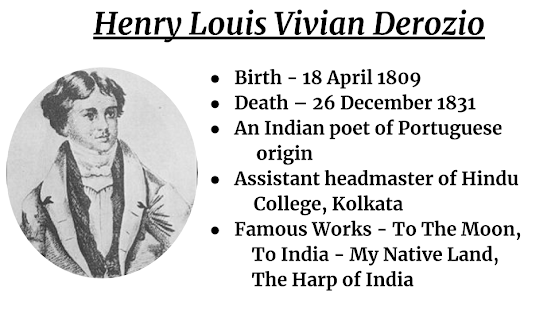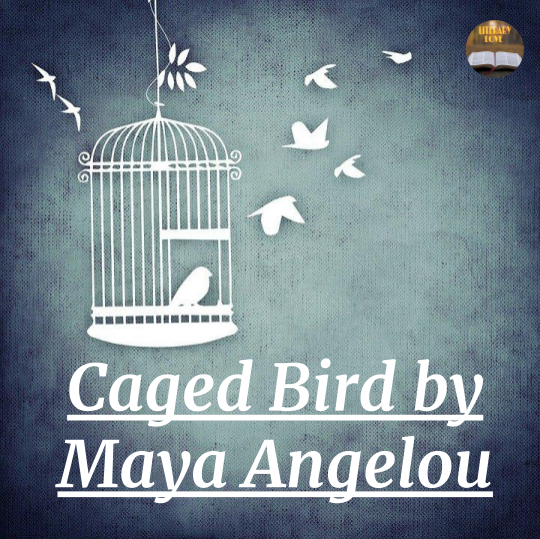To India - My Native Land by Henry Louis Vivian Derozio
My country! in thy day of glory past
A beauteous halo circled round thy brow,
And worshipped as a deity thou wast—
Where is that glory, where that reverence now?
Thy eagle pinion is chained down at last,
And grovelling in the lowly dust art thou:
Thy minstrel hath no wreath to weave for thee
Save the sad story of thy misery!—
Well–let me dive into the depths of time,
And bring from out the ages that have rolled
A few small fragments of those wrecks sublime,
Which human eyes may never more behold;
And let the guerdon of my labour be
My fallen country! one kind wish for thee!
INTRODUCTION –
"To India - My Native Land" is a remarkable poem by the renowned Indo-Anglican poet, Henry Louis Vivian Derozio. It was written and published in 1828 as part of his book, The Fakeer of Jungheera: A Metrical Tale and Other Poems. It is a patriotic poem written during the period of the Indian Renaissance when India was under British Rule. The poem is in the form of a Petrarchan sonnet where the octave (the first eight lines) describes how India was worshipped and praised during ancient times and how slowly its grandeur has declined whereas, in the sestet (last six lines), the poet describes his plans to retain India's glory and make her as strong and powerful as before. The poem follows the rhyme scheme of ABABABCC DEDEFF and is written in iambic pentameter. The poet here presents the glorious period of India and tries to make the readers aware of India’s past. It presents a contrasting picture of India in her past and at the present, under British rule.
POET –
Henry Louis Vivian Derozio (18 April 1809 – 26 December 1831) was an Indo-Anglican poet of Portuguese origin. He was inflamed by a patriotic spirit for his native Bengal and considered himself an Indian. He served as a lecturer and assistant headmaster at the Hindu College of Calcutta. His works discuss the theme of love, nature, patriotism, and transitions of life. His famous works include To India - My Native Land, Morning after a storm, A Walk by Moonlight, Sonnet - To The Moon, To the Dog Star, etc.
SUMMARY –
LINES 1 TO 4 -
The poem starts with the speaker describing his motherland, his country as a deity. He states that during ancient times, his country was glorious and rich in every field. It was a period when India was famous for advanced civilizations and rich cultural traditions. People from all over the world used to visit India and learn its ancient knowledge, culture, and skills. India was worshipped like a goddess, who had a bright halo near its forehead. But time has changed and so has the poet's motherland. India no longer sustains its beauty and glory. It is under the rule of the British who have used and destroyed it. The British government ransacked India for their country’s benefits making its condition worsen day by day.
LINES 5 TO 8 -
In the next lines, the poet describes India as an eagle, a bird of immense power but this eagle is tied down in chains. Its wings have been clipped and it cannot fly. The Britishers have bound our country by making it their slave. It longs for its freedom and its former glory but it is denied that. That is why the poet says it is " grovelling in the lowly dust". The poet further says that he has no flowers to weave a “wreath” or garland for his motherland. His country which has been corrupted and drained has lost all its resources. There are not even any flowers left with which he could worship his country or make a wreathe for her.
LINES 9 TO 14 -
However, in the next lines, the poet vows to bring his country back from this degrading state to its former state of glory. He promises to dive into the deep depths of glorious Indian history and bring the materials for future improvement. These materials are so small and sublime that they may not be visible to the human eyes. Even, the Britishers have tried to hide these by stating them as old-fashioned and useless. However, the poet stands against that. He will work hard to save his country and to return it to its former glory. This is his one last wish for his motherland, India.
THEMES –
- Patriotism - In the poem, the speaker writes of the "past glory" of India and how the country that was once "worshipped as a deity" has been chained down to the lowest depths. Derozio writes about some of that heritage of the distant past and in return hopes for a "kind wish" from the country and its people. He vows to return his country to its former glory by diving deep into its glorious path.
END –
The poem is a famous patriotic poem by Derozo. He expresses sadness at the state of his motherland and hopes to create a better future for it. Through this poem, he expresses his aim to spread historical consciousness among Indians. He resorts to his motherland to wish him luck. If he succeeds, he wants nothing in return from his country. This poem might have been written to alert the Indians of the need of the hour.











1 Comments
Its a very good explanation of this poem ! 👀
ReplyDeleteThank u so much ✨🥹